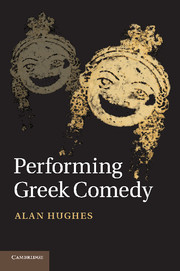Book contents
- Frontmatter
- Contents
- Illustrations
- Preface
- Chapter 1 Comedy in art, Athens and abroad
- Chapter 2 Poets of Old and Middle Comedy
- Chapter 3 Theatres
- Chapter 4 The comic chorus
- Chapter 5 Music in comedy
- Chapter 6 Acting, from lyric to dual consciousness
- Chapter 7 Technique and style of acting comedy
- Chapter 8 The masks of comedy
- Chapter 9 Costumes of Old and Middle Comedy
- Chapter 10 Comedy and women
- Chapter 11 New Comedy
- Catalogue of objects discussed
- Notes
- Glossary
- Bibliography
- Index
Chapter 5 - Music in comedy
Published online by Cambridge University Press: 05 February 2012
- Frontmatter
- Contents
- Illustrations
- Preface
- Chapter 1 Comedy in art, Athens and abroad
- Chapter 2 Poets of Old and Middle Comedy
- Chapter 3 Theatres
- Chapter 4 The comic chorus
- Chapter 5 Music in comedy
- Chapter 6 Acting, from lyric to dual consciousness
- Chapter 7 Technique and style of acting comedy
- Chapter 8 The masks of comedy
- Chapter 9 Costumes of Old and Middle Comedy
- Chapter 10 Comedy and women
- Chapter 11 New Comedy
- Catalogue of objects discussed
- Notes
- Glossary
- Bibliography
- Index
Summary
‘Now listen to me’, Dionysos tells the shades of Aischylos and Euripides in the Underworld, ‘I came down here for a poet. Why? So our city could survive and continue her choral festivals’ (Frogs 1417–19). The chorus and its music were central to the life of the polis and the public events that defined it, and the choreutai were its citizens. The chorus was fundamental to comedy, tragedy and satyr play, no less than to dithyramb. ‘Bring on your chorus’, the herald cried to start the play. And when a chorus sang and danced, it was invariably accompanied by the aulos. Greeks used a variety of musical instruments. At the symposion an educated man was expected to sing, and play the barbitos, the small lyre associated with Dionysos. Apollo's lyre was the kithara, a large concert instrument, which could be played alone, or to accompany a soloist. In spite of their divine connections, stringed instruments lacked the power and mobility required to accompany a chorus in a large theatre.
The aulos
The aulos consisted of a pair of tubular pipes, made of bone, ivory or wood. Unlike a flute, which is played by blowing across a column of air, the aulos had a mouthpiece fitted with a double reed, as in an oboe; finger holes governed the length of the air column that vibrated when the musician blew through the reed. The double pipe migrated to Greece from Phrygia by way of Thrace, gaining popularity as festivals multiplied. Easily made and highly portable, it was not difficult to play, although to play it really well required virtuosity. It became ubiquitous, accompanying public sacrifices and processions, private ceremonies like weddings and funerals, and exercise at the palaistra; soldiers marched to the aulos, and it gave the stroke for rowers on warships. Musicologists believe that the two pipes ‘spoke together, perhaps in unison’. Because its tone was ‘brilliant and exciting’, Plato and Aristotle distrusted the irrational Dionysian emotions the aulos aroused. ‘Loud and penetrating’, it obliged choruses to sing lustily in order to be heard distinctly, but the aulos could conveniently hide an occasional mistake. The instrument's range was limited until late in the fifth century, when technical innovations by Pronomos extended its capabilities.
- Type
- Chapter
- Information
- Performing Greek Comedy , pp. 95 - 105Publisher: Cambridge University PressPrint publication year: 2011



